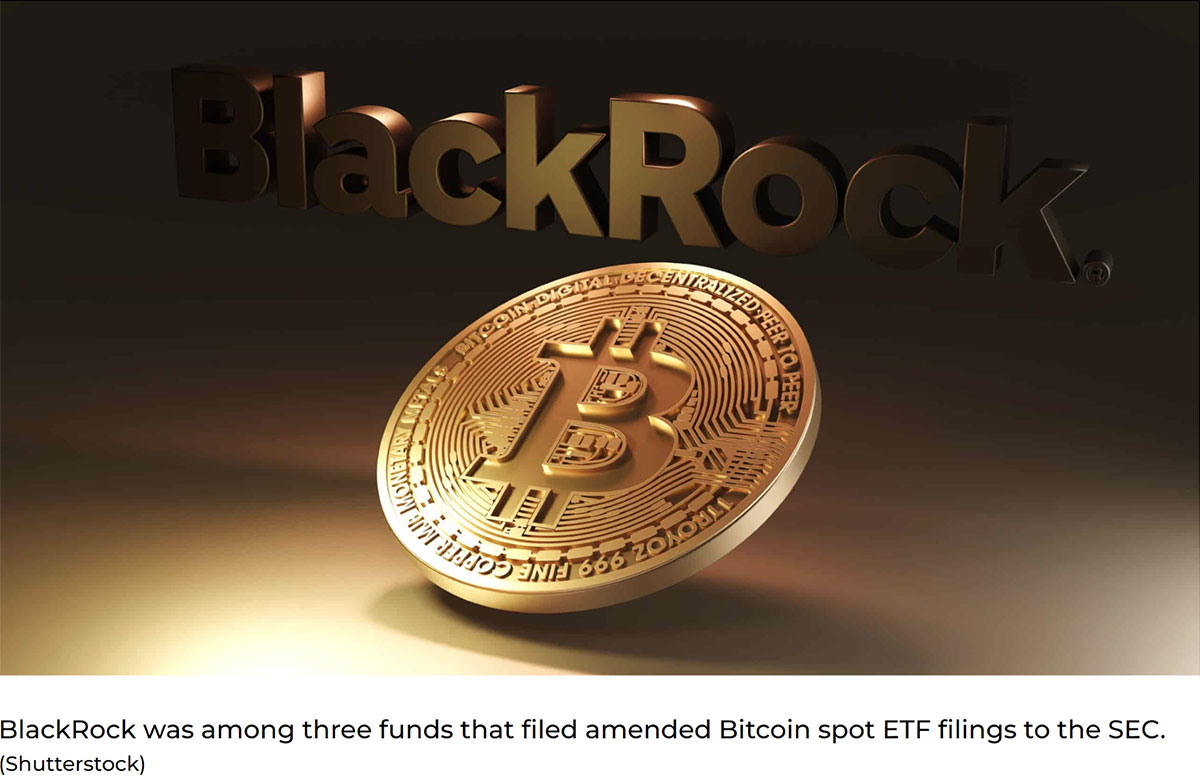
The pursuit of regulatory approval for bitcoin spot exchange-traded funds (ETFs) has intensified, with major asset managers—BlackRock, ARK Invest, and WisdomTree—submitting amended proposals to align with the U.S. Securities and Exchange Commission's (SEC) preferred redemption strategy. These adjustments are anticipated to streamline the approval process, signaling a crucial development in the cryptocurrency market.
BlackRock's Amendment for iShares Bitcoin Trust:
BlackRock, a global giant in asset management, has taken a pivotal step by revising its proposal for the iShares Bitcoin Trust. The primary modification shifts the redemption mechanism from in-kind to cash, a change disclosed in an amended S-1 filing. The traditional in-kind redemption allows investors to redeem their fund shares for the actual bitcoin held in the ETF. However, the updated proposal introduces a cash creation model, wherein funds would convert bitcoin into cash during the redemption process—an adjustment that aligns with the SEC's emphasis on heightened safety protocols.
Other Filings by ARK Invest and WisdomTree:
In tandem with BlackRock, other major players, including ARK Invest, associated with renowned investor Cathie Wood, and WisdomTree, have also submitted similar amendments to their bitcoin spot ETF proposals. This collective move by asset managers underscores a unified effort to accommodate the SEC's preferred redemption model.
Implications for Investors:
Bloomberg ETF analyst James Seyffart suggests that the recent amendments may not have a direct impact on the average investor. The discernible differences are expected to manifest in the back-end operations, influencing how ETFs engage with authorized participants and market makers. These key entities play a pivotal role in maintaining liquidity, ensuring an ETF's price aligns with its net asset value (NAV). The adoption of a cash redemption model introduces nuances in the process of creating and redeeming shares, involving the conversion of bitcoin into cash.
Advantages for Efficient Fund Issuers:
Seyffart highlights the potential advantages for fund issuers equipped with robust trading desks and easy access to liquidity. The efficiency in converting cash into bitcoin and vice versa during the creation and redemption of shares becomes a critical factor in gaining a competitive edge in the evolving ETF landscape.
In-Kind Redemption Still on the Table:
Despite the SEC's expressed preference for cash redemptions, BlackRock remains optimistic about the possibility of returning to in-kind redemptions for the iShares Bitcoin Trust. The potential ticker for the fund is IBIT. The filing notes that transactions involving the issuance and redemption of baskets, representing units of the ETF, could occur in exchange for either cash or bitcoin, contingent on regulatory approval for in-kind transactions.
WisdomTree's Confusing Amendment:
WisdomTree's amendment introduces an element of confusion, seemingly incorporating in-kind redemptions. The filing indicates that baskets are issued or redeemed based on the Trustee's determination of an amount of bitcoin or cash on each trading day when the exchange is open.
SEC Meetings and Preferences:
Active engagement between the SEC and the funds behind various spot bitcoin ETF filings has been notable. Meetings involving the SEC, BlackRock, and Nasdaq Stock Market employees have taken place, with BlackRock presenting a detailed comparison of in-kind versus cash redemption models. The amended filings from major asset managers suggest a leaning towards the SEC's preferred cash redemption model.
Ohanae OTC Market Platform's Role:
The recent amendments to bitcoin spot ETF proposals by BlackRock, ARK Invest, and WisdomTree underscore a shift towards the SEC's preferred redemption strategy. While these changes might not have an immediate impact on the average investor, they signal a collective effort by asset managers to align with regulatory preferences, potentially expediting the approval processes. Ongoing discussions between the SEC and fund issuers hint at an evolving landscape for cryptocurrency-related financial products. Additionally, the emergence of platforms like the Ohanae OTC Market Platform adds another layer of dynamism to the crypto asset securities space, shaping the future trajectory of the market.
Unchained: Interview Replay
Why Spot Bitcoin ETFs Are TradFi's 'Holy Grail'
Disclaimer
An offering statement regarding this offering has been filed with the SEC. The SEC has qualified that offering statement, which only means that the company may make sales of the securities described by the offering statement. It does not mean that the SEC has approved, passed upon the merits or passed upon the accuracy or completeness of the information in the offering statement. The offering circular that is part of that offering statement is at https://vdr.ohanae.com/projects/ohanae. You should read the offering circular before making any investment.
Ohanae Securities LLC is a subsidiary of Ohanae, Inc. and member of FINRA/SIPC. Additional information about Ohanae Securities LLC can be found on BrokerCheck. Ohanae Securities LLC is in discussions with FINRA about exploring the expansion of business lines for the broker/dealer. Any statements regarding abilities of Ohanae Securities LLC are subject to FINRA approval and there are no guarantees FINRA will approve the broker/dealer’s expansion.
Ohanae Securities is seeking approval to be a special purpose broker-dealer that is performing the full set of broker-dealer functions with respect to digital asset securities – including maintaining custody of these assets – in a manner that addresses the unique attributes of digital asset securities and minimizes risk to investors and other market participants. If approved, Ohanae Securities will limit its business to digital asset securities to isolate risk and having policies and procedures to, among other things, assess a given digital asset security’s distributed ledger technology and protect the private keys necessary to transfer the digital asset security.